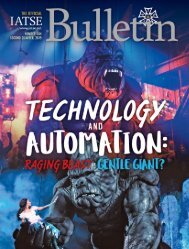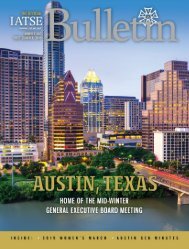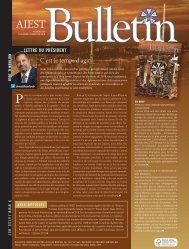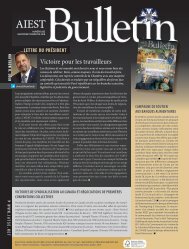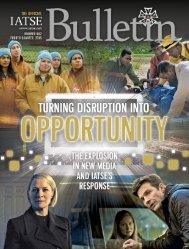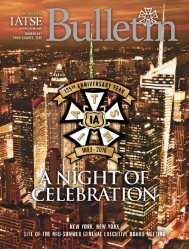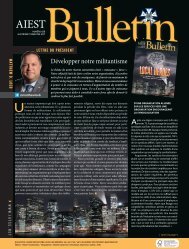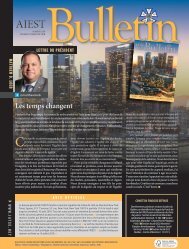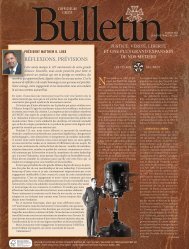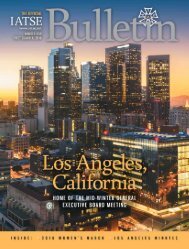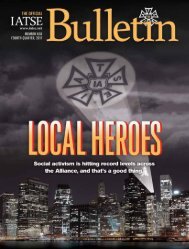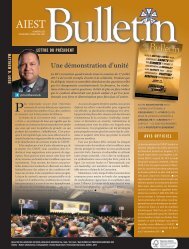IATSE-2nd2018_web
You also want an ePaper? Increase the reach of your titles
YUMPU automatically turns print PDFs into web optimized ePapers that Google loves.
ecame law over President Harry Truman’s veto) established<br />
the structure for multiemployer plans governed by boards<br />
made up of equal numbers of labor and management representatives.<br />
Through collective bargaining, employers would<br />
contribute a certain amount of money to these plans per employee,<br />
and the plans would provide the workers with health<br />
and pension benefits.<br />
That’s why two broad plans were launched to meet the retirement<br />
and health needs of members — the Motion Picture<br />
Industry Pension & Health Plans, and the <strong>IATSE</strong> National<br />
Benefit Funds.<br />
MOTION PICTURE INDUSTRY<br />
PENSION & HEALTH PLANS<br />
The Motion Picture Industry Pension & Health Plans are<br />
multiemployer, non-profit, Taft-Hartley Funds established<br />
by collective bargaining agreements to provide pension and<br />
health benefits for <strong>IATSE</strong> members working in the production<br />
of motion pictures or engaged primarily in furnishing materials<br />
or services for motion picture productions.<br />
The first plan was establisehd in 1952 to provide health<br />
and welfare benefits to members of the entertainment industry<br />
without any lapse in coverage when a participant went from<br />
one job to another. Now known as the Motion Picture Industry<br />
Health Plan, it currently provides coverage to more than<br />
130,000 people.<br />
One year later, a second plan was established to provide<br />
retirement benefits to members. The Motion Picture Industry<br />
Pension Plan currently distributes nearly $25 million (before<br />
taxes) in pension payments to more than 18,000 retired participants,<br />
their survivors or beneficiaries.<br />
In 1979, a third plan was established to provide supplemental<br />
retirement benefits funded by employer donations.<br />
The Motion Picture Industry Individual Account Plan (IAP)<br />
has grown significantly since its founding, both due to the<br />
performance of its investments and increases in wages and the<br />
number of work hours of its hard-working participants. It is<br />
not unusual for someone who has been in the industry for<br />
thirty or more years to withdraw an IAP account balance in<br />
the six figures.<br />
In 1990, the administrations of the Health Plan and the<br />
Pension Plan merged. Although they are two separate legal<br />
entities, the Plans are known as the Motion Picture Industry<br />
Pension & Health Plans (MPI). Since then, several other pension<br />
and health plans merged with the MPI, including several<br />
on the East Coast, which led to the establishment of an MPI<br />
New York office.<br />
In 2017, more than 1,800 employers contributed to MPI, and<br />
upwards of 96.5 million hours were reported by employers on<br />
behalf their employees. These record-setting numbers show the<br />
strength of the entertainment industry — and <strong>IATSE</strong>’s dominance<br />
of its workforce. Today, the combined investments of MPI<br />
total more than $8.4 billion.<br />
<strong>IATSE</strong> NATIONAL BENEFIT FUNDS<br />
The <strong>IATSE</strong> National Benefit Funds (NBF) were launched<br />
more than sixty years ago to provide retirement and, later,<br />
health security for members. They are also multiemployer,<br />
non-profit, Taft-Hartley Funds established by collective<br />
bargaining agreements, ensuring continuity of coverage in<br />
fields where employment is temporary, sporadic or episodic,<br />
involving multiple employers. There are now four primary<br />
funds.<br />
The first plan, the<br />
<strong>IATSE</strong> National Pension<br />
Fund was established<br />
in 1957. Now known as<br />
Plan A, its first partici-<br />
63




